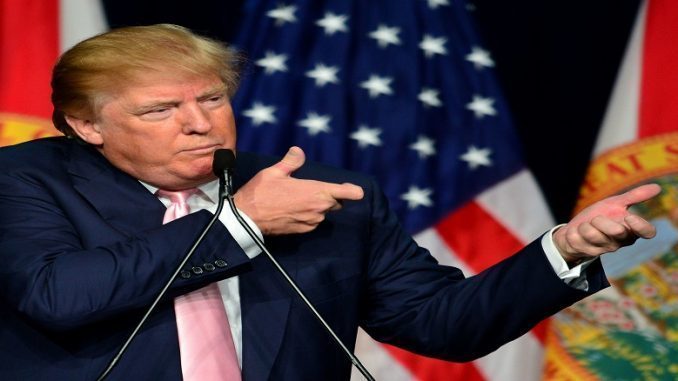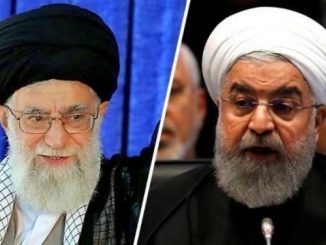
After weeks of heightened tensions between Iran and the United States, national security adviser John Bolton’s visit to Abu Dhabi this week signaled that there isn’t an easy way out of the dispute that Trump’s withdrawal from the Iran nuclear deal triggered one year ago.
Without offering evidence, Bolton said Wednesday that Iran was “almost certainly” behind several attacks on oil tankers near the Persian Gulf in mid-May. Even though Iran rejected those accusations, the incidents had previously raised fears of a — perhaps accidental — direct confrontation between U.S. and Iranian forces in the region.
President Trump initially appeared to agree with the hawkish rhetoric of Bolton and other advisers. But he has since shifted to a more conciliatory approach. On Monday, speaking at a joint news conference with Japanese Prime Minister Shinzo Abe, Trump said, “We’re not looking for regime change. I want to make that clear.”
But as Trump dials down the rhetoric on Iran, the United States has stepped up pressure on a different front in recent days: Europe.
As WP Carol Morello reported, Secretary of State Mike Pompeo is expected to be in Europe starting Thursday to visit Switzerland, the Netherlands, Germany and Britain. And discussions about Iran are likely to be on the agenda as an issue that is driving the United States and Europe further apart. Britain, France and Germany resisted U.S. pressure to follow the United States last year out of the Iran deal, which was negotiated to stop the country from being able to produce a nuclear bomb. And tension over that decision continues to simmer.
In early May, Pompeo’s planned trip to Berlin was canceled, as he rushed to Iraq to address tensions with Iran in a surprise visit. The move was seen as an affront in Berlin and other European capitals. Days later, Pompeo crashed a meeting of European foreign ministers in Brussels, aiming to convince Europe to abandon its stance. But the last-minute visit yielded no specific outcomes.
E.U. diplomats repeatedly suggested that they considered the United States to be partially responsible for the tensions and called for restraint to prevent a military conflict in the region.
Though the White House accuses Europe of aiding Iran by sticking to the 2015 nuclear deal and preventing the negotiation of a different deal, Iran insists that Europe is not doing enough to save the agreement. This month, Iranian President Hassan Rouhani set a 60-day deadline to get relief from reimposed U.S. sanctions and threatened that Iran would otherwise resume enriching uranium to a higher level than now allowed. Even though the sanctions were imposed by the Trump administration, the Iranian move appeared to be mostly directed toward the Europeans, who have looked at options to circumvent U.S. sanctions.
Those European efforts have centered on the creation of a payment channel with Iran, which in theory could allow European companies to keep trading with the country despite U.S. sanctions. The Paris-based Instrument in Support of Trade Exchanges (INSTEX) was formally registered by Britain, France and Germany more than three months ago and is expected to operate essentially like a clearinghouse for credit points. This would avoid a need for the exchanging of real money. Europe hopes that continued trade will keep Iran adherent to its commitments under the nuclear deal.
The rationale is that a company backed by three major U.S. allies could bind the Trump administration’s hands, as any move to sanction INSTEX or companies trading through it would pit Washington against Berlin, London and Paris. More countries may still join the effort: News media in Spain reported this month that the country was considering throwing its weight behind the initiative.
The experiment is being closely watched. If expanded, it could challenge the global dominance of the U.S. dollar, which is most often used for international transactions and allows the United States some control over the global economy. India, which has long relied on Iranian oil but is also a U.S. ally, has started using a system that is separate from but similar to the E.U. effort, the Wall Street Journal reported on Wednesday.
If INSTEX or other alternatives were to succeed, international trade systems that bypass the U.S. currency could limit future U.S. administrations’ ability to use sanctions as foreign policy tools. The bigger questions this raises over the global longer-term repercussions of Trump’s decision to withdraw from the Iran deal explain the furious U.S. responses to INSTEX in recent weeks.
The United States has warned that Germany, Britain and France are unlikely to be able to launch INSTEX without violating their own red line: to have the payment channel meet existing norms for legitimate financing.
U.S. Treasury Undersecretary for Terrorism and Financial Intelligence Sigal Mandelker said this month that she wondered “how that’s even remotely possible.” Mandelker has since doubled down by threatening a legal challenge from the United States against the European-Iranian channel. U.S. representatives insist that INSTEX would inevitably be linked to Iranian entities under U.S. sanctions, for instance the Islamic Revolutionary Guard Corps.
“Engaging in activities that run afoul of U.S. sanctions can result in severe consequences, including a loss of access to the U.S. financial system,” Mandelker wrote in a letter to INSTEX, according to Bloomberg News.
This escalation raises the real possibility that Trump’s withdrawal of the United States from the Iran deal last year might result not only in further U.S. sanctions against Iran, but also against an entity created by some close U.S. allies in Europe.
*By: Rick Noack – The article was published by the Washington Post on 30 May 2019.



